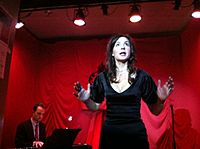Indre Viskontas facts for kids
Quick facts for kids
Indre Viskontas
|
|
|---|---|
 |
|
| Alma mater | University of California, Los Angeles, PhD (2006); San Francisco Conservatory of Music, MM (2008) |
| Scientific career | |
| Fields | Neuroscience, opera |
| Institutions | San Francisco Conservatory of Music, University of California, San Francisco, University of San Francisco |
Indre Viskontas is a scientist and a professional opera singer who has combined her two passions in a unique career. As a neuroscientist, she studies the human brain, especially how we remember things and how we become creative. As an opera soprano, she performs on stage, singing in a powerful, high-pitched voice.
Viskontas has a Ph.D. in cognitive neuroscience from the University of California, Los Angeles (UCLA) and a Master's degree in opera from the San Francisco Conservatory of Music. She teaches at both the University of San Francisco and the San Francisco Conservatory of Music, sharing her knowledge of both science and music.
Contents
Early Life and Education
Indre Viskontas grew up in Toronto, Canada. Her parents had moved there from Lithuania after World War II. Music was a big part of her childhood. Her father was a choral conductor, and she started singing in choirs when she was only five years old.
She began studying opera as a child and even performed with the Canadian Opera Company at age 11. Even while she was studying for her Ph.D. in neuroscience at UCLA, she never stopped practicing music. After earning her science degree, she went on to get a Master of Music degree.
A Career in Science and Music
Viskontas has built a career that connects her two fields of expertise: the brain and music.
Exploring the Brain's Mysteries
As a scientist, Viskontas researches how our brains work. She is especially interested in memory, how we solve problems, and what makes us who we are. She also studies how creativity works in people who have brain diseases like frontotemporal dementia and Alzheimer's disease.
To do her research, she uses advanced tools like functional magnetic resonance imaging (fMRI), which can take pictures of brain activity. She has published more than 50 research articles and book chapters about her findings. One of her interesting projects involves teaching people with special hearing devices called cochlear implants how to sing.
A Life on the Stage
Viskontas has performed as a soprano in many operas. She has played roles like Beth in Little Women and Aurelia in Dioclesian. She is also the co-founder of Opera on Tap, a group that aims to make opera fun and easy for everyone to enjoy, much like pop music.
She is also the Creative Director of Pasadena Opera. There, she directed an opera based on a famous case study by Dr. Oliver Sacks called The Man Who Mistook His Wife for a Hat.
Sharing Science with the World
Viskontas uses her performance skills to teach people about science. She has hosted podcasts and appeared on television to make science easier to understand.
In 2011, she co-hosted a TV show on the Oprah Winfrey Network called Miracle Detectives. On the show, she investigated claims of miracles and supernatural events from a scientific point of view. Her goal was to encourage people to think critically and deeply about their beliefs.
From 2013, she co-hosted a popular science podcast called Inquiring Minds. She has also appeared on many other TV shows and podcasts, including The Oprah Winfrey Show, CNN, and This Week in Science.
Books
In 2019, Viskontas wrote a book called How Music Can Make You Better. In the book, she explains how listening to and playing music can affect our brains, our bodies, and our communities in positive ways. She discusses how music can be a powerful tool for learning, feeling, and even healing.


